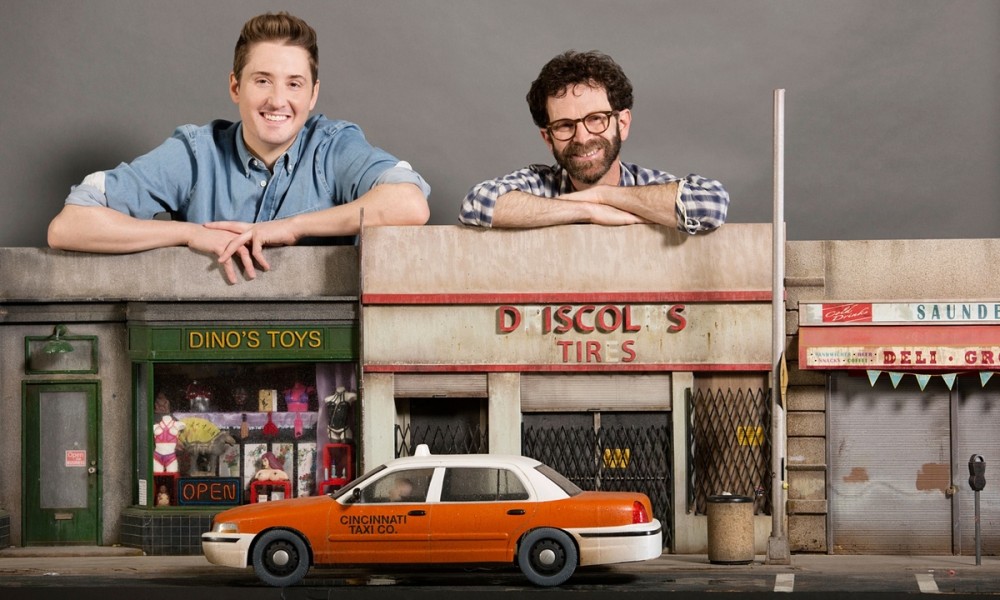
It’s a new year and with that comes all the exciting releases for films that showed up late last year and are making their way around the world, and not just LA/NY. One of those great flicks is Anomalisa, directed by Duke Johnson and Charlie Kaufman–based on Kaufman’s radio play of the same name–and lucky little me had a chance to kick off my Tuesday morning this week with an interview that was pretty lively and interesting as a whole. In a mix of laziness and sheer longing to get this stuff out there, it’ll be mostly formatted in transcript form, and I urge everyone to check out the first half of my piece in the Miami New Times (because it’s essential and also a cool conversation and lead-in), as well as my review here.
—
Juan Barquin: So, the hotel is called the Fregoli, and obviously that’s a pretty straightforward reference to the delusion, but one of the most notable movies to, I guess, approach that delusion is Invasion of the Body Snatchers to an extent.
Charlie Kaufman: Oh yeah, I didn’t notice that. Though, from my point of view, this is a metaphor about – the character doesn’t really suffer from this delusion, it was something that I had read about that I decided would be an interesting way to talk about someone’s inability to connect to people or see people. I feel like to say it’s the Fregoli Delusion, it kind of just makes of the rest of the movie moot. Okay, there’s something wrong with this guy, as opposed to some problem that people have. But I like that Body Snatchers reference, I didn’t notice that.
J: The whole thing kind of falls into this romantic drama, dark comedy animation, genre spectrum.
Duke Johnson: [laughs] Yeah, that’s about right.
J: Well, there is this feeling – like the dream sequence, it sort of comes across as this paranoid thriller, very similarly to Invasion, or other films of that type. It’s supposed to be a jarring and off putting thing, but it seems like there’s a clear place where, like paranoia, the feeling that you’re conspired against by other people, and existentialism, the feeling that the universe is indifferent to your plight, intersect. Even though the movie seems kind of disjointed and secluded in a way, how do you manage to make every one of these tonal shifts feel as a piece? Like, how do they feel cohesive?
C: Well, just sort of on a surface level, the paranoid thriller element that you talk about takes place in a dream. It’s happening in his head, and therefore it can have a slightly different tone than his reality. Though it can be argued that the entire film is a dream, and that’s just a dream within a dream. Because there’s this whole surreal element to the movie, and maybe that’s cohesive. Obviously, that they’re puppets and we have the same performers in the whole thing makes it cohesive to us. We didn’t really feel like that was a struggle for us. I didn’t think about it.
D: Yeah, no, we established directorially kind of rules for the world, like these are how there are certain character performance traits that make these characters specific, and they stay who they are throughout the world. So no matter what happens to them, like Micheal’s in a room full of secretaries and they all have the same face, and you know, it’s like, it’s not different. It’s how would he react in that situation.
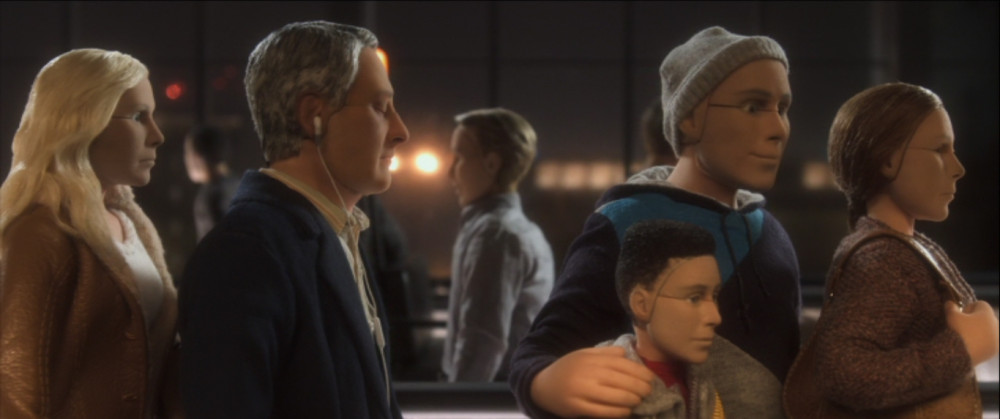
C: And everyone throughout the whole movie has the same face. So it’s not like a revelation. It’s not like, “Oh my god, that’s weird.” That’s what the whole movie has been. Certainly, the biggest shift in terms of personality is Emily. I think she’s very evil, at that point. “Where you gonna go, Michael? You can’t hide from us.” But to me it’s important that it’s a dream, and the epiphanies Michael has in that sequence are arguably completely wrong. It’s not like the conclusions he draws that everyone is the same person – it’s a dream! It’s a nightmare. In the real world, when he approaches that, specifically asks his wife, “Who are you?” She doesn’t know what he’s talking about, or seemingly doesn’t know what he’s talking about.
J: Although, that stare at the end, towards him and the doll is very implicative of it being real.
D: There’s just consistent ideas and approaches to the cinematography and the lighting and the colors of the film, and how it’s shot, and the shot selection, and that makes it a cohesive thing.
C: There are exaggerated elements in the dream sequence that you wouldn’t find elsewhere in the movie. The golf cart. Everything else is naturalistic. The fact that all the lights are switching off behind Michael as he’s running with Lisa. All that is just dream. His face – I don’t want to put that in, but what happens with his face doesn’t happen anywhere else in the film.
J: I’m kind of bouncing off the notion of hive mind, but Tom Noonan, voicing literally everyone else, is amazing in this movie.
C: And in real time. We’re not cutting that together. We recorded their voices as if it were a play. So, he’s doing that from character to character.
J: I was going to ask, how do you direct someone to give a voice to a bazillion characters while a) making each iteration slightly different and b) always making it recognizable as him?
C: Well, that was the direction.
J: That’s it?
C: [laughs] Yeah, keep your voice the same and change your personality, and – we did this as a play first, so Tom had the experience of working it out. The actors in this, there’s not much you had to do with them.
J: They’re so good. I actually preferred Jennifer Jason Leigh in this than I do to Hateful Eight. But that’s a whole different story.
C: Oh really? I actually haven’t seen Hateful Eight. I want to see it, but –
J: It’s still playing on 70mm here.
D: We’re going to watch it on our iPhones later. Just like Tarantino intended. [laughs] Just kidding.
J: One of like–I thought it was just so amusing–when he’s flipping to the tv, the cutaway to My Man Godfrey. I obviously kind of wanted to ask about the inclusion of this scene, and ask how it feels to stylize live action film into animation figures. Basically remaking it.
D: It was originally Casablanca in the play, you needed just sound. So you needed really iconic dialogue, and this was more of a visual thing. And we couldn’t get Casablanca. So we found My Man Godfrey.
C: We just couldn’t afford it.
D: So we found My Man Godfrey and we think it worked perfectly.
C: Because it’s so visual. And we found a scene that was one shot. it’s just through the doorway. And we talked about putting the two things side by side on the DVD extras, because it’s almost perfect.
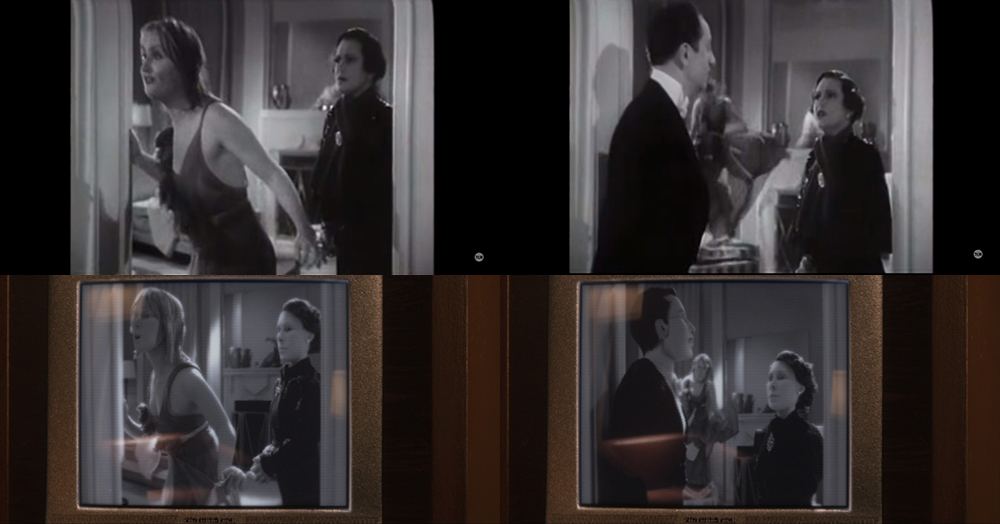
J: I totally took screencaps of the DVD and my other copy of My Man Godfrey. I have no shame. [Laughs] Another movie I wanted to bring up, not that it’s in it, but that this felt like sometimes for me was David Lean’s Brief Encounter. I don’t know if that ever kind of came to mind.
C: I have never seen it.
J: Really?
D: I had seen it, and it was a reference of ours on our vision board. Just in general, there’s stuff that happens in Brief Encounter where the camera, like two people will be talking and there’ll be subtle lighting shifts and things that occur within the frame that kind of articulates what’s going on within the character.
C: I just wanna bring up, in another interview, I feel like we’ve had a Some Came Running reference. Which is another movie I’ve never seen.
D: It’s so crazy that people are spotting our references, that’s very weird to me.
J: Please, if I had another viewing chance, I would probably bring up more. [laughs]
D: But there’s nothing taken from Brief Encounter. Just the fact that it was a kind of general tonal thing, and that people have spotted that is amazing. But we did, like, in the sex scene and when it pulls back, there is a subtle dimming of the lights, except the lights on the bed, and it’s something you’re not aware of unless—
C: He’s aware. [laughs]
J: Okay, to close out the chat, and move away from Anomalisa for a hot minute, I kind of want to know what you films you two saw last year that you dug in particular, because I’m always so interested of like what filmmakers saw.
D: I saw most of them. Did you see anything?
C: I don’t remember, sometimes I’ll come in and say I saw something.
D: I can think of one you liked but I don’t know if I should say it before you say it so you can confirm.
[pause, look at each other for a few seconds]
D: The one about about the teenage girl?
C: The Diary of a Teenage Girl? Yeah, I did like that one.
J: I literally have the book in my bag right now. I’ve been finishing reading it.
C: The book is really great. Even better.
J: The book is fantastic so far.
C: Yeah, I thought the movie was great and I thought the actress who played the lead, Bel Powley, is amazing. That’s for me, the movie was great. And Kristen Wiig was for me kind of revelatory.
J: She’s such a good dramatic actress.
C: I think she’s great doing dramatic stuff, but in this one there was absolutely no Kristen Wiig in it.
D: I saw everything and I liked a lot of stuff, but I just watched Mr. Holmes yesterday, which is… whatever. I haven’t decided how I feel about the movie yet, because I’m a little confused by it – I stopped and started it on two different planes. But I thought Ian McKellan’s performance was like really good. I was really moved by his performance. He didn’t climb inside of a horse or anything, but—
C: He climbed into our hearts.
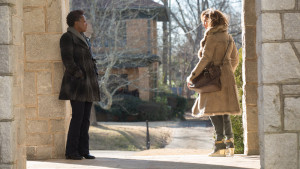
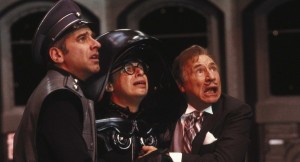
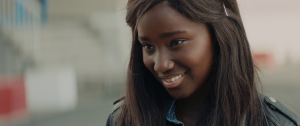
 Derek
Derek
 Isabelle
Isabelle